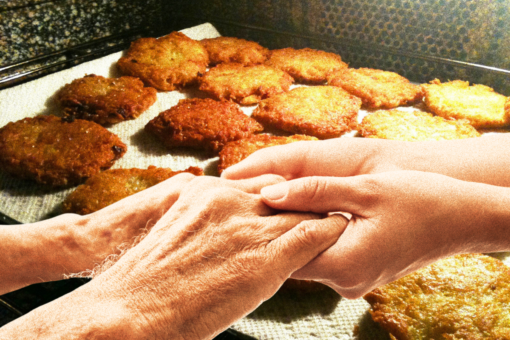After finishing the FX on Hulu series “Fleishman Is In Trouble,” I was left with a sense of having participated in something special. Yes, part of it was the acting, which was superb, and part of it was the writing that got right to the heart of what it feels like to find yourself living a life that’s totally different from the one you had planned. Part of it was the sweeping, almost wistful shots of New York City in the summer. But what struck me most was how this series gave us two Jewish female characters that defied the stereotypes we have grown so accustomed to seeing on our screens.
“Fleishman,” created and written by Taffy Brodesser-Akner and based on her 2019 novel of the same name, stars Jesse Eisenberg as the titular character: Toby Fleishman, a divorced 40-something liver doctor re-entering the dating world and grappling with the mysterious disappearance of his ex-wife, Rachel (Claire Danes, in a tour de force performance). The eight episodes of the series follow Toby as he navigates the summer after his divorce as a single father, increasingly angry at Rachel’s absence and supported by his best friends from college Seth (Adam Brody) and Libby (Lizzy Caplan), who act as sounding boards and cheerleaders in the echo chamber of Toby’s disdain for his ex-wife. As in the book, Libby narrates largely from Toby’s perspective, chronicling where Toby and Rachel went wrong and tracing Rachel’s evolution from Toby’s manic-pixie-dream-girl to his nightmare.
Imagine how easy it would have been for “Fleishman” to stop there, for the series to resemble the bevy of stories revolving around the dissolution of a relationship between a nebbishy-but-well-meaning Jewish man and the one-dimensional Jewish woman who acts as both scapegoat and shrew. For the hapless, underappreciated Toby to remain the victim and for Rachel to remain a funhouse-mirror reflection of all the Jewish American Princess’s negative qualities, filtered entirely through Toby’s myopic lens.
In a genius move, Brodesser-Akner shows us what this version of the story would look like through “Decoupling,” Toby and Libby’s favorite novel by the fictional journalist Archer Sylvan (a perfectly cast Christian Slater). An account of a year in the life of a divorced man, “Decoupling” revolves around the rejection of the female point-of-view, a stance Sylvan makes clear during an interview he gives at the 92nd Street Y in the series’ fifth episode: “Have you ever asked a woman what her divorce was like? It’s the same old thing, the same story…I wanted to write the story of a person’s soul…you can’t get to the truth of a thing if you ask [a woman].”
Of course, it is particularly telling that both Toby and Libby love “Decoupling.” Toby, after all, filters his memories of Rachel through his own resentment, jealousy and insecurity — Toby’s version of Rachel, a social-climbing, money-obsessed “ambition monster” with no maternal instinct to speak of and no respect for his career, steps straight out of “Decoupling” as the embodiment of Archer Sylvan’s “bitch [who] will try to get you every time.” And Libby, perhaps more concerningly, has a talent for identifying against women, and against herself — first in her career, pigeonholing herself as the perpetually overlooked “girl writer” at a men’s magazine for 15 years before finally realizing that “no matter how hard you work, if you’re a woman, you can’t be a man,” and then in her personal life, obsessing over Toby and Rachel’s relationship at the detriment of her own marriage.
“Fleishman” deconstructs the entire narrative pattern of “Decoupling” slowly, then all at once. The first six episodes lull us into a false sense of familiar binaries, helped along by Libby’s one-sided narration: Toby is good, Rachel is bad; Toby is a loving father, Rachel is an unnatural mother; Toby has a meaningful job and a likable friend group, Rachel works in entertainment and surrounds herself with shallow one-percenters; Toby is level-headed, Rachel is “crazy.”
Then everything changes. In the penultimate episode, “Me-Time,” Libby finds a dazed Rachel sitting on a park bench and she — and the audience — finally hear her side of the story. In the midst of a mental breakdown brought on by exhaustion and a crippling fear of abandonment, Rachel has no idea how much time has passed, or that she has not seen her children for weeks, or even that anyone has been looking for her. “Me-Time” shows us Rachel outside of Toby’s perspective — lonely, burdened by childhood trauma, a survivor of postpartum depression brought on by her doctor inducing labor without her consent, obsessed with providing her children with the financial stability she never had, married to a husband who misunderstands her just as much as she misunderstands him, screaming (literally) for an unconditional love she never receives. Struck by Rachel’s experiences, Libby finally understands the woman she has spent so much time dismissing, and more importantly, relearns the fundamental lesson of storytelling that eventually inspires her to write her novel: “…there are no real villains in life, not really. There are no real heroes, either. Everyone is great and everyone is terrible and everyone is flawed, and there are no exceptions to that.”
It makes sense, then, that showrunner Brodesser-Akner told the Hollywood Reporter that she sees “Fleishman” as a “story about storytelling,” and that Libby, a Jewish woman, is ultimately the person who gets to the heart of Rachel’s story (and, in doing so, rediscovers herself).
After realizing that her career has stagnated and that she needs to quit her magazine job, Libby tells her husband, “I don’t even feel like anybody reads anything I write unless it’s about a man.” On the surface, “Fleishman Is In Trouble” — the book that Libby has been narrating throughout the entire series — seemingly confirms that viewpoint. Yet, a closer watch of the series reveals that Toby is not the Fleishman we should be paying attention to, and that Libby’s subtle narration does not revolve around Toby as much as it exploits Toby’s own self-absorption in order to drive the story to its inevitable climax, one that empowers both Rachel and Libby not as caricatures, side characters or villains, but rather as women who are, for better or worse, unapologetically themselves. Together, they embody Libby’s desire, so articulately expressed in the third episode “Free Pass,” to “free [themselves] from every Jewish girl cliché,” and the best part is they both do it without negating either their Jewishness or their femaleness.
Conversations about quantum superposition — the mathematical principle that outlines the possibility of two concurrent versions of the same reality — recur throughout “Fleishman Is In Trouble,” and the series offers a refreshing solution to the problem of Schrödinger’s Jewish woman, tearing the cover off the proverbial box and exposing the truth that the best of contemporary female-driven Jewish television has been hinting at for the past decade: that Jewish women are complicated and fully human, that they can have bad qualities without being “bad,” that they deserve the same amount of attention, interiority and room for error as male antiheroes. Television’s Jewish woman has the power to regenerate herself (much like Toby’s beloved liver) through Jewish female storytelling.



